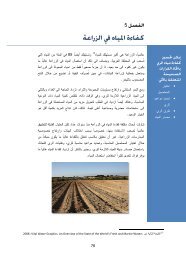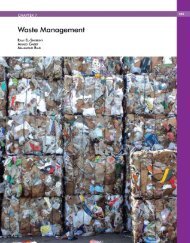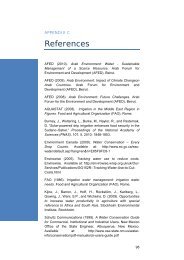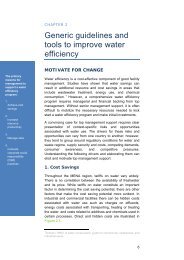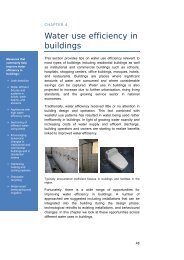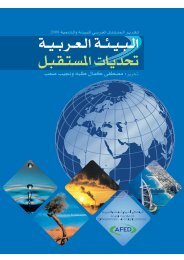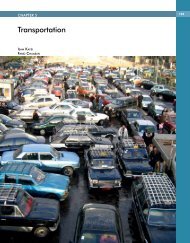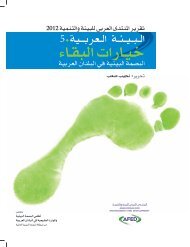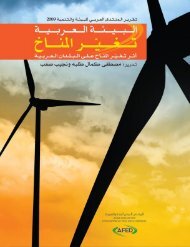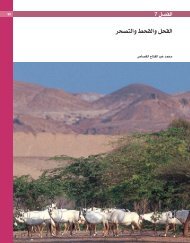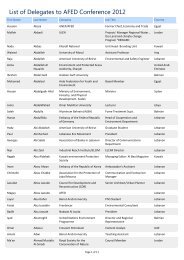Impact of Climate Change on Arab Countries - (IPCC) - Working ...
Impact of Climate Change on Arab Countries - (IPCC) - Working ...
Impact of Climate Change on Arab Countries - (IPCC) - Working ...
Create successful ePaper yourself
Turn your PDF publications into a flip-book with our unique Google optimized e-Paper software.
ARAB ENVIRONMENT: CLIMATE CHANGE 61<br />
FIGURE 15<br />
PERCENTAGE INCREASE OF SURGE REGIONS MENA<br />
% Increase<br />
90<br />
80<br />
70<br />
60<br />
50<br />
40<br />
30<br />
20<br />
10<br />
0<br />
Egypt<br />
Algeria<br />
Libya<br />
Morocco<br />
Iran<br />
Qatar<br />
Tunisia<br />
Saudi <strong>Arab</strong>ia<br />
UAE<br />
Oman<br />
Yemen<br />
Kuwait<br />
Source: Dasgupta et al., 2009<br />
• Establishing an instituti<strong>on</strong>al system for risk<br />
reducti<strong>on</strong> for integrating and coordinating<br />
research and carrying out training <strong>on</strong> the<br />
nati<strong>on</strong>al and regi<strong>on</strong>al scales.<br />
• Establishing str<strong>on</strong>g m<strong>on</strong>itoring systems for<br />
coastal z<strong>on</strong>e indicators and law enforcement.<br />
Developing a database for nati<strong>on</strong>al and regi<strong>on</strong>al<br />
indicators <str<strong>on</strong>g>of</str<strong>on</strong>g> climate change<br />
• Developing a Regi<strong>on</strong>al Circulati<strong>on</strong> Model<br />
(RCM) for the impact <str<strong>on</strong>g>of</str<strong>on</strong>g> climate change <strong>on</strong><br />
MENA countries and the Red Sea. Building<br />
capacities and reducing uncertainties <str<strong>on</strong>g>of</str<strong>on</strong>g> predicti<strong>on</strong>s<br />
• Adopting an integrated coastal z<strong>on</strong>e<br />
management approach to protect coastal<br />
resources with special reference to expectati<strong>on</strong>s<br />
<str<strong>on</strong>g>of</str<strong>on</strong>g> future severities and increasing frequencies<br />
<str<strong>on</strong>g>of</str<strong>on</strong>g> extreme events<br />
• Adopting a proactive planning approach and<br />
developing policies and adaptati<strong>on</strong> programs<br />
for no regret planning, protecti<strong>on</strong> <str<strong>on</strong>g>of</str<strong>on</strong>g> the low<br />
land areas in the coastal regi<strong>on</strong> and coastal<br />
cities in the Nile Delta, Tunisia, Mauritania<br />
and Gulf regi<strong>on</strong>, exchanging experiences and<br />
success stories.<br />
• Upgrading awareness <str<strong>on</strong>g>of</str<strong>on</strong>g> decisi<strong>on</strong> makers <strong>on</strong><br />
strategic aspects and developing employment<br />
opportunities for vulnerable groups.<br />
VII. CONCLUSION<br />
AND RECOMMENDATIONS<br />
This chapter has shown that the coastal areas in<br />
the <strong>Arab</strong> regi<strong>on</strong> are highly vulnerable to the<br />
potential impacts <str<strong>on</strong>g>of</str<strong>on</strong>g> climate change. Proactive<br />
acti<strong>on</strong> needs to be taken, both in terms <str<strong>on</strong>g>of</str<strong>on</strong>g><br />
expanding knowledge and cooperati<strong>on</strong>, and<br />
implementing mitigati<strong>on</strong> and adaptati<strong>on</strong> policies.<br />
The main c<strong>on</strong>clusi<strong>on</strong>s and recommendati<strong>on</strong>s<br />
are listed below:<br />
• Although all <str<strong>on</strong>g>of</str<strong>on</strong>g> the <strong>Arab</strong> countries do not c<strong>on</strong>tribute<br />
more than 4.5% to the total emissi<strong>on</strong>s<br />
<str<strong>on</strong>g>of</str<strong>on</strong>g> GHGs, the coastal z<strong>on</strong>es <str<strong>on</strong>g>of</str<strong>on</strong>g> most <str<strong>on</strong>g>of</str<strong>on</strong>g> them<br />
are highly vulnerable to the potential impacts<br />
<str<strong>on</strong>g>of</str<strong>on</strong>g> sea level rise and the expected increased<br />
severity and frequency <str<strong>on</strong>g>of</str<strong>on</strong>g> extreme events.<br />
• Even though some <str<strong>on</strong>g>of</str<strong>on</strong>g> the <strong>Arab</strong> countries have<br />
established instituti<strong>on</strong>al capabilities for the<br />
mitigati<strong>on</strong> <str<strong>on</strong>g>of</str<strong>on</strong>g> greenhouse gas emissi<strong>on</strong>s, n<strong>on</strong>e<br />
has established such systems for adaptati<strong>on</strong><br />
and self protecti<strong>on</strong>.<br />
• Excluding Tunisia and Morocco, no integrated<br />
nati<strong>on</strong>al strategic acti<strong>on</strong> plans have been<br />
established for the vulnerable countries.<br />
• A strategic assessment and risk reducti<strong>on</strong> <str<strong>on</strong>g>of</str<strong>on</strong>g><br />
climate change impacts must be carried out as<br />
a joint effort through the League <str<strong>on</strong>g>of</str<strong>on</strong>g> <strong>Arab</strong><br />
States.<br />
• An early warning system <str<strong>on</strong>g>of</str<strong>on</strong>g> tsunamis for the<br />
Mediterranean and the Gulf regi<strong>on</strong>s must be<br />
established through satellite systems.<br />
• Proactive planning and protecti<strong>on</strong> policies<br />
and measures should be initiated for vulnerable<br />
sectors with particular emphasis <strong>on</strong> the<br />
coastal z<strong>on</strong>e.



